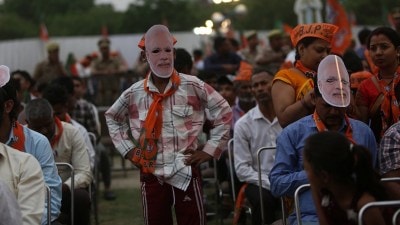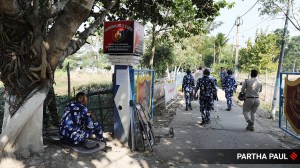- India
- International
Not a penny more, not a penny less
Akku and Shankar have four other children, including two sons.
 Leela (right) joined the teachers’ training institute a month after Akku. The only two women and the only two employees on contract at the institute, Akku and Leela soon became good friends. Source: Selvaprakash Lakshmanan
Leela (right) joined the teachers’ training institute a month after Akku. The only two women and the only two employees on contract at the institute, Akku and Leela soon became good friends. Source: Selvaprakash Lakshmanan
Sitting in the front porch of her three-room house, 65-year-old Leela Challa makes no effort to hide her tears. But it’s in the smile she shares with Akku Sherigara, 63, that lies the story of these two women of Udupi in Karnataka’s coastal district and their 42-year fight.
On July 4, the Supreme Court gave a final warning to the state government to pay Akku and Leela the dues owed to them in salaries and entitlements. That could amount to Rs 30 lakh each — or more than 100 times what they have individually earned in four decades, working as temporary labourers, for a monthly salary of Rs 15. For 13 of those years, they worked without any pay.
Their job involved cleaning the 21 toilets at the government-run Women Teachers’ Training Institute (WTTI) in Udupi every day — without leave, perks or benefits. They finally stopped working in December 2013. Last month, Leela suffered a paralytic stroke and can no longer use her left hand.
Despite repeated assurances, the management at WTTI never regularised their jobs, says the president of the NGO Human Rights Protection Foundation (HRPF), Ravindranath Shanbhag, who has assisted the two in their legal battles.
Akku, who lives in Kannarpady, remembers the June 1971 day she went to the WTTI to claim the pension of her mother Sheshi, who had worked there from 1921 till she died that year, for Rs 3 a month. The officials asked Akku, then 21, whether she would like to take up her mother’s job.

“The officials said they didn’t owe my mother any pension but offered me her job for Rs 15 per month. They assured me I would soon be made a permanent employee with a salary raise,” says Akku.
She jumped at the opportunity as her husband Shankar Sherigara’s earnings as a manual scavenger were not enough to sustain the family. Married at the age of 13, Akku already had two children by then.
Akku’s daughter Shobha Sherigara, who works as a tailor in a garment company, remembers her mother hardly ever being home as she was growing up. “Amma couldn’t even make it to family occasions as she was forced to work on Sundays too. She would save whatever money she could to buy us clothes,” says Shobha.
Akku and Shankar have four other children, including two sons. Shobha is the youngest, and unmarried. One of Akku’s sons is also unmarried.
Leela lives in Gandhinagar, a few kilometres away. Her three daughters are all unmarried. They dropped out of school before matriculation and don’t work.
Leela joined WTTI a month after Akku, getting to know about the job from her grandmother. The only two women and the only two employees on contract at WTTI, Akku and Leela soon became good friends.
According to the two, they kept hoping the promised salary hike would come, and approached the authorities several times. Finally, in 1998, they moved the Karnataka Administrative Tribunal (KAT), seeking that their jobs be regularised. In return, the Karnataka Education Department, which runs WTTI, terminated their services. No reason was given since, officially, their jobs were temporary.
According to a government order dated August 6, 1990, all casual and daily wage employees, who would have completed 10 years of sevice on July 1, 1994, had to be regularised. But the state government argued that Akku and Leela did not meet the criterion as they were appointed as part-time workers.
While not on the rolls, Akku and Leela kept going to WTTI till 2011, and working without pay. “We nursed the hope that we will get justice some day,” says Akku.
A senior staff member at WTTI says the two came without fail. “They never told anyone their problems. We would see them working together and eating out of a small tiffin wrapped in a handkerchief, sitting close to a flagpost,” she says. However, everyone at the institute knew about their case.
Showing a photograph dating back to the 1980s of herself and T M D’Souza, a former teacher at the institute, Akku says fondly: “She provided me moral support.” During the years that the women didn’t get paid, the families managed on the meagre earnings of Shankar and Leela’s husband K Rama, both daily wage labourers.
Her children asked her why she kept slaving for the institute, Leela remembers. “I said the government will pay the dues soon. I knew it was not true.”
Akku adds that there was not a single government minister of the region visiting Udupi whom she did not meet seeking assistance, including former Union minister Veerappa Moily. “What hurt me the most was when I accompanied a local leader to meet then chief minister B S Yeddyurappa. He ridiculed me, saying if he honoured one request, a thousand more would come,” Akku says.
In 2003, KAT ordered the Karnataka Education Department to regularise their services and to pay their salary dues as per a D-grade employee. The state government, however, went in appeal to the Karnataka High Court. Dismissing their writ petition, the high court upheld KAT’s directions.
In 2010, the apex court too upheld the high court order and directed the Karnataka government to regularise the services of Akku and Leela. By that time, both were nearing 60.
However, the Karnataka government kept delaying acting on the Supreme Court order, saying it was moving another appeal.
Finally, in 2012, the HRPF filed a contempt petition against Karnataka in the Supreme Court. The state government’s immediate reaction was to pay Akku and Leela Rs 2.11 lakh each in 2013 and Rs 3.68 lakh each in 2014.
While it was nowhere near the Rs 30 lakh they had been claiming — as court orders had told the state to consider them as permanent employees since 1971 — the money was still a godsend.
Akku, who hoped to buy a silk sari, ended up spending the money on her ailing husband. Leela kept it aside for the marriage of her daughters, though a lot has got spent since she fell ill.
Udupi district officials warn that Akku and Leela’s battles may still not be over. “More than once we have sent proposals saying the arrears due to them amount to over Rs 30 lakh, but the files have been sent back with remarks that the estimate is exaggerated,” a district official says.
The Supreme Court order did not specify the amount, only saying that the dues be paid. That gives the government scope to bargain.
WTTI serving principal Shekhar said they were computing the arrears and would complete the process within three months.
When she does get the money, one of the first things Akku hopes to do is help her husband Shankar get a dialysis as his kidneys have failed. She also hopes to get her daughter and son married.
Leela’s family is looking forward to providing her treatment for her paralysis.
Since Akku and Leela’s fight for rights became known, the HRPF has received 76 petitions where long-serving ‘temporary workers’ claim to have been denied payment or permanent jobs.
Over at the WTTI, no fresh appointments for sweepers under ‘D category’ have been made, though Shekhar says they will be doing so soon.
News of Akku and Leela’s struggles did result in offers of charity, but they were not interested. Leela’s nephew Vinod says she warned him against taking any money from anybody.
“Why should we accept charity when we can live simply with the amount due to us? We don’t need any more, no matter how long it takes,” says Leela.
Apr 25: Latest News
- 01
- 02
- 03
- 04
- 05







































